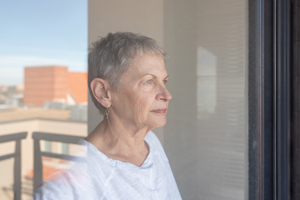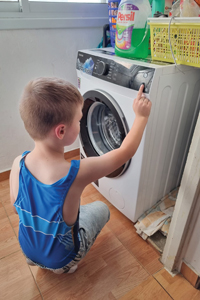
Homecare Brings Hope to Troubled Families in Southern Israel
By: ICEJ Staff
It is still early morning. Birds are singing, and the sun has just greeted a new day as Corrie van Maanen and a colleague from ICEJ Homecare begin their rounds. They start early to avoid Jerusalem’s busy morning rush-hour traffic. Once a month, ICEJ Homecare heads south to Arad and Beersheva, in the Negev desert, to visit, strengthen, and comfort Jewish immigrant families in need. Homecare works to build relationships with those we care for by responding to their needs—and sometimes, it takes years to develop that rapport.
About 18 months ago, Ada lost her husband after many years of illness, suffering, and multiple hospital visits. Ada took care of him with love, perseverance, and what little strength she had since she also had serious health issues. But she forgot about her own needs and put her emotions aside. As a result, she fell into a deep depression when her beloved husband passed.

The years of only giving had taken their toll. The curtains of Ada’s small apartment stayed closed. The television became her companion. She feared everything outside her home and did not want to leave.
Because of her relationship with ICEJ Homecare, built so carefully over the years, we continued our monthly visits. Emotionally, Ada did not have the strength to talk with us. Our monthly visits stopped at the front door and were very short. But we continued visiting her, month after month. We prayed for the complicated situation and encouraged Ada as best we could. We knew with the right help from a doctor and her children, things could turn around.
After a year-and-a-half, Ada finally opened the door for us again, and a little ray of hope sparked her depressed heart. We came in, listened to her heart, and heard her say: “I do want to get better, to be able again to reach out and help other people.”
Several times she expressed her thankfulness that we never forgot or gave up on her. Our visits—though short and just to the front door—had meant a lot to her. After spending time in her home once again, we left with our hearts filled with joy and hope. Yes, more healing is still ahead for Ada, but she has hope again.

We moved on to see a single mother whose youngest son knew we were coming and was jumping with excitement. He greeted us with big hugs. For this mom, however, life is filled with challenges. She and her three young children live on the third floor of an apartment building with no elevator. We stood at her side, listening to her stories.
Since the war broke out in Ukraine, she constantly worries for her parents, her brother, and her brother’s family, who are all close to the fighting. They cannot leave, and when she hears their reports of agony and distress from the war, it only adds to this young mother’s anxieties.
Not long ago, she called us, panicked: her washing machine had stopped working and could not be repaired. With her small income, she could not afford the unexpected costs of a new washer. But she could not live without one, either—not even a week—so Homecare quickly responded to her need. We returned to Beersheva that same week, took her to an appliance store, and—thanks to generous Christian donors—bought her a new washing machine.
“This machine is quieter than a windmill,” her little son said as he examined the new washer. Meanwhile, his mother was in tears with thankfulness.
These are two of many stories from ICEJ Homecare visits where we try to love and bless needy Jewish immigrants in Southern Israel. We are grateful to our faithful supporters—with your help, we can keep doing this precious work the Lord has given into our hands.


